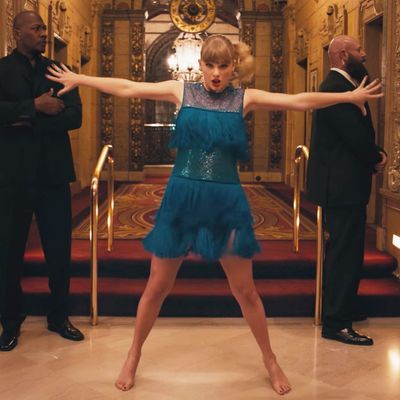
The magic in Taylor Swift’s video for “Delicate” starts when, in a brief moment alone before a mirror, the singer reads a golden note. Before, she’d been under near-total surveillance. Filmed, photographed, and interviewed at every turn, she couldn’t go unnoticed. Nice fans make demands on her time. Deranged fans lay claim to her body. When she moves, four bodyguards move with her. If privacy was air, she’d be suffocating.
But then a change happens. After she reads the note, she can’t see her reflection in the mirror. Some women enter the room, and they can’t see her either! She tries to catch her bodyguards’ attention, to no avail. She inserts herself between people; they carry on as if she isn’t there. Perhaps out of politeness, she doesn’t try to touch anyone. Most people are driven half-mad when they can’t get any attention; Swift, who gets attention even when she doesn’t want any, is overjoyed. But fear not, she’s still relatable: Like most people have at some point when they’re alone, she begins to dance, awkwardly. After taking off her shoes and tearing away the lower third of her blue dress, Swift’s jerky motions carry her over hotel desks and cobblestones and subway platforms until she finally reaches her destination: a bar. Some people look up as she enters, but it might not be her they’re seeing.
The whole thing is, of course, a conceit. Even if everyone else in the video pretends not to see her, the camera does, and millions of viewers can see through its eye. Why is anyone watching a Taylor Swift music video, if not to see Taylor Swift? As its title suggests, Swift’s recent album Reputation was essentially a coping strategy to deal with the fact that the artist, who for a decade seemed to have mastered the science of getting people to view her exactly the way she wanted them to, had suddenly lost control of her own narrative. It’s a long campaign to show the world that she hasn’t been owned, and every song is framed as a battle. Musically speaking, “Delicate” is a victory, one of Reputation’s three or four best tracks. Her voice aired out through a vocoder, Swift recounts a tale of tentative romance in the wake of being publicly disgraced, and the sound is brisk enough, and her lyrics deft enough, to transmit her longing to be seen as she really is.
But the video is another matter. If past videos are any proof, Swift is a capable, though far from electrifying, dancer; if her clumsy dancing for “Delicate” can inspire, among casual viewers, a cringing so extreme as to verge on a sublime experience, one can rest assured that it was entirely choreographed and wholly intentional. To lift from the lyrics themselves, if anyone likes this dance, they really must like her for her: The video is for those for whom Taylor, even if she’s dressed like two pygmies in skirts stacked on top of each other, even if her facial expression is at times unmistakably grotesque, and even if she replicates the actions of a palsied crab, can do no wrong.
It’s a daring move by Swift to cripple one of her best new songs with some of the corniest physical motions ever committed to film just to use the corniness as a kind of loyalty oath. Major artists have thinned out the ranks of their fans with clumsy maneuvers before, but for Swift to do so on purpose is remarkably spiteful. In less than two years she’s gone from being sabotaged by others to accidental self-sabotage; now she’s self-sabotaging on purpose. It’s not the progression most people would have liked to see from Swift, but maybe, just maybe, that’s precisely why she’s doing it.

